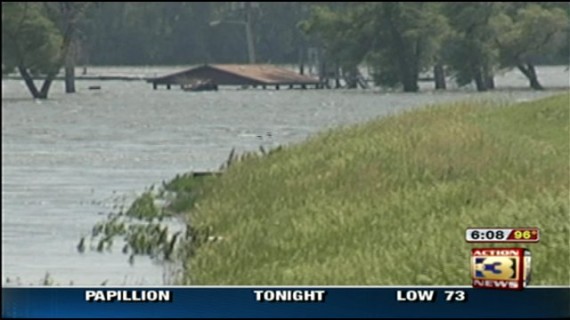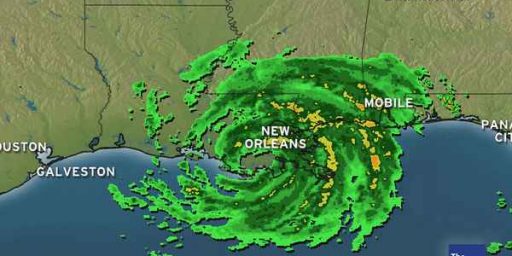Offutt Air Force Base and STRATCOM In Danger
Two major American military installations are in serious danger. From rising water, not terrorist attacks.
Two major American military installations are in serious danger. From rising water, not terrorist attacks.
OTB Roving Correspondent Richard Gardner passes along this report from Omaha’s Action News 3:
The Papio-Missouri River Natural Resource District is working hard to build a levee to protect an 18-mile stretch along the Missouri River and Papio Creek by Haworth Park. Beyond the levee are homes, major businesses and Offutt Air Force Base.
“The potential for those levees breaching is certainly there,” said Marlin Petermann with Papio-Missouri River Natural Resources District.
The most immediate threats are to Offutt Air Force Base, Stratcom, Papillion Creek Waste Water Treatment Plant, a concrete plant and the Salvation Army summer camp, “These areas would have to be evacuated if the levee is breached,” said Petermann.
The NRD is already inspecting it’s levees along the Missouri River and Papio Creek twice a day. Soon they could have someone out there around the clock. Petermann says they’ve done all they can to prevent the flooding, “We haven’t found any weak areas. The levee is in good condition,” said Petermann.
The question is, will the levees be strong enough to withstand major amounts of flood water through the entire summer and then some? “Here we’re talking months and that sustained period of water up against a levee very high within a couple feet at the top will be substantial test on the levee system,” said Petermann.
It’s amazing that, despite a trillion dollar defense budget, our best recourse against flooding–a danger not of recent origin–has not advanced beyond deploying fat old men with sandbags and hoping for the best.







Nothing to see here…
Nope, this is all very normal. Not unusual at all:
Move along, move along.
Don’t change your behavior now, people. Adapt to the coming hell. Adapt! Oh, and it might be a good idea to just stay away from water entirely. Nobody lives near water, do they?
mantis, I thought there’s a difference between “weather” and “climate.” At least, that’s what we were told when hurricane season was normal, and the winter was OK, and whatnot.
J.
I imagine it would be unwise to deploy skinnier, less buoyant men.
Yes, not to remove all the warnings of the first post, but statisticians will tell you to look at more variables, i/e/, how many more people are living in flood zones than 50 years ago? How much of the rise of tornados is really a rise in portable television equipment that can upload a ‘great image!’ of a ruined street in a manner of minutes? Devastating tornados used to be local stories only. Now, there are more news vans, more and more developed land and more hours to fill on cable news. It equals = more tornados!
I thought there’s a difference between “weather” and “climate.”
Hey, you’re correct about something! Good job! Gold star for Jay.
However, as usual, you miss the point. The increase of water in our climate is a direct result of warming, and more extreme weather is a cumulative result of that increase in water. If there’s more water vapor in the atmosphere, then storms are larger, floods are higher and more frequent, and low lying areas experience more destruction. See, climate drives large-scale and global weather trends, not necessarily individual events or local seasonal variances. However, we have in recent years seen a lot of unprecedented problems related to extreme weather, as is the case of the Papio-Missouri River. This is merely a case in point of the overall trend. Do you dispute the overall trend, or do you just want to talk about how Al Gore is fat?
At least, that’s what we were told when hurricane season was normal, and the winter was OK, and whatnot.
Trends, Jay. Trends are what are important. Ignore them at your own peril.
All I know is that the weather this spring has certainly put the “misery” in Missouri.
John Peabody : I highly suggest you spend a little time googling tornadoes and you questions will be quickly answered..
Someone on another story was trying to tell me that global warming leads to drought.